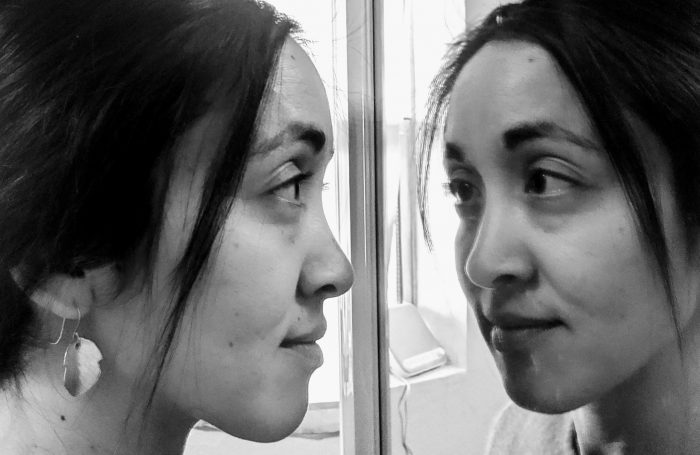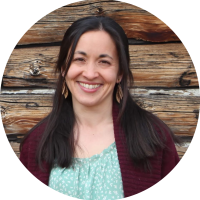Enough dreamworking years have passed that I’d say I’m “experienced” in working with my dreams, but I wouldn’t say I’m an “expert.” I’m not sure I’ll ever say that, because I’m not sure a person can be an expert on their own dreams.
Yet, I also hold this belief: Only the dreamer can know the meaning of their own dream.
These two ideas are true at the same time. How?
First of all, I’m convinced of what dreamwork teacher and author Jeremy Taylor said: “No dream comes to tell us what we already know.” I’d even say that every dream gives us a nudge about our own blind spots.
How are we supposed to see our own blind spots? That’s like trying to look at your own face. We need other people to be our mirrors.
My companions in a dream discussion group are mirrors. They’re prisms, too. They reflect my dream back to me, and they bend its light, so I see it in a new, multicolored way. When my dream group listens to me retell a dream, they notice my tone of voice, how I move, and what words I choose. They reflect those back, and I hear myself more clearly.
Just as importantly, they project their own natures and experiences onto my dreams. They tell me those projections (a.k.a., their “interpretations” of my dream, from their perspective). Offered with respect, in the spirit of helping me heal and grow, their projections often take me right into an “ah-ha” moment.
It’s those “ah-ha” moments that tell us we’re onto something. When I feel that sense of knowing, that recognition, then I can affirm, “Yes, this is what the dream was about.”
So, the dreamer is the only one who recognizes what their own dream means – but we can’t recognize anything if we don’t get the chance to look at it first. We help each other uncover meanings that we weren’t yet conscious of, giving us the opportunity to recognize them at all.
I say “meanings,” plural, because each dream has many layers of meaning. A dream can speak about our relationships, our emotional life, our physical health, our creative work, our ecosystem, and more, all at once, through the brilliance of story and symbol.
Groups are incredible for helping us connect with these many layers. One person in the group might be attuned to the health layer (that’s often me!), another to the emotional, a third to the ecological, and so on. With all those voices in the choir, the dreamer has the chance to hear a gorgeous variety of notes that might resonate.
In all these ways, community enhances my relationship to my dreams. At the same time, dreams enhance my relationship to my community. Talking about dreams together brings us right into the heart and soul of things. We are immediately engaged with what matters most to us (even when the dream doesn’t make any sense, for a while at least). The depth of connection I can get when I’m talking with someone about our dreams is rare, and delicious.
Do you talk about your dreams with anyone? Thinking about forming a group? If you are, I’d highly recommend Jeremy Taylor’s book, The Wisdom of Your Dreams. Here, I’ll share with you a few things I like to bring up in the beginning, to set the stage for a fulfilling, supportive experience:
1. Share dreams (or dream images) in present tense, describing the scene so your companions can imagine it as vividly as possible. For example, “I’m in a hallway with white tile and a few potted plants. I can hear footsteps on the other side of a wall.” Simply retell the dream at first. Afterward, you can add some related information from waking life if you feel that it’s important. For example, “The hallway looks like the one in the apartment building where my favorite aunt lives.”
2. When you share ideas for interpretation, own them as your projections by saying, “If this were my dream,” and speaking in first person. So, rather than, “I think you’re still trying to baby your daughter when you should just let her drive away,” offer the dreamer, “If this were my dream, I’d relate this to my daughter getting ready to leave home. I’d think stuffing the trunk of her car with little coats and boots is about how I’m trying to take care of her like I used to, but this just takes up space in her new vehicle.” Also, feel free to simply share what you got out of someone else’s dream. You definitely will get something out of other people’s dreams! Like, “This brings home how much I miss my grandparents, too.” Share those moments – they may resonate with others.
3. Create a sense of relaxed safety by committing to each other that you’ll keep everything that’s shared confidential.
4. Be aware that unexpected emotional pain, psychological issues, or just “tough stuff” in general can come up in dreamwork. That’s part of the beauty of dreamwork, but it’s a beauty you wouldn’t want to be caught by unawares. A dream group isn’t psychotherapy. It isn’t dreamwork with a personal guide or facilitator, nor a substitute for those. If you want to dive deeper or you’re healing from trauma and need support, reach out to someone who can work one-on-one with you.
I delight in the idea of more dream groups forming, more people mirroring and prisming for one another, deepening our collective relationship with the dreamworld.
Originally published on thedreamersden.org.











Read 1 comment and reply